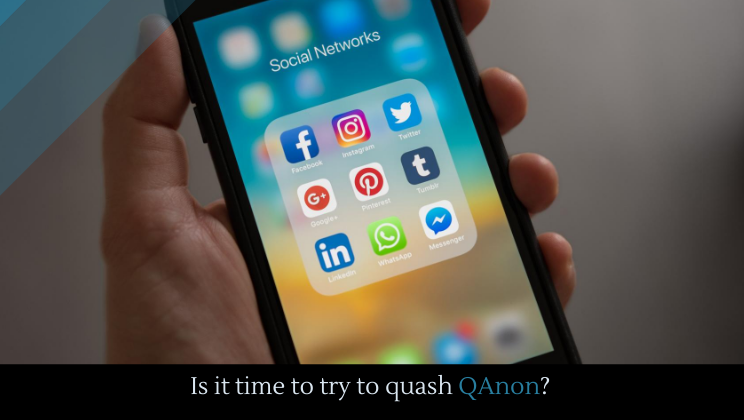Is it time to try to quash QAnon?
Posted by Ivan Vaquero / August 10, 2020
Is t he conspiracy community known as QAnon becoming dangerous? According to a recent Washington Post article, the Trump campaign actively courted the online conspiracy community QAnon in the lead-up to the 2020 election, which makes an alarming combination. According to a recent piece in Bloomberg Business, it might be time to try intervening in the online community, but just how to do so is a serious question. The problem is, you can’t easily ban QAnon supporters from Twitter, for example, because they find new ways to engage on the platform, either in secret or by subverted other conversations.
Twitter has banned 7,000 accounts related to the QAnon conspiracy theory, all of whom have violated the site’s policy on harassment. Twitter will also limit the spread of QAnon-related misinformation, which is expected to impact another 150,000 users. Unfortunately, QAnon conspiracists believe that big companies like Twitter are already part of a conspiracy against freedom, so this is basically guaranteed to go poorly.
Ed Mullins, the head of the New York city police department union recently gave an interview on Fox News via Zoom. Just behind Mullins’s shoulder sat a QAnon mug. If you haven’t heard of QAnon, perhaps you’re lucky. It’s a conspiracy theory born on 4Chan, and named after a user who claims to be an in-the-know government insider. In over a year’s worth of cryptic tweets, QAnon has managed to convince a sizable group of Americans that the world is run by a cabal of satanic pedophiles led by elite liberal politicians. Let that sink in for a moment.
If you think this sounds familiar, you’re right. In early December of 2016, a very confused young man entered a Washington D.C. pizzeria armed with an assault rifle. He was there to investigate a conspiracy about a child prostitution/political corruption ring being run through the restaurant. The #pizzagate conspiracy was originally stoked by conspiracy theorist Alex Jones, and with the help of social media the conspiracy led to violence. In the year or two after the #pizzagate conspiracy died down, critics focused their blame on on Alex Jones and the ultra-ring-wing conspiracy crowd like him.
The Pizzagate conspiracy was, in some ways, the proto-QAnon theory. Indeed, it contributed to the QAnon meta-theory. QAnon added another element: in addition to the massive satanic pedophile cult led by liberal elite, there was also one man who could stop them. You guessed it, Donald Trump.
And you can probably guess who loves this theory. Yup, Trump. He’s retweeted hints to the theory before, but his latest is a reminder that he’s willing to do anything, appeal to anyone to keep power.
QAnon is nothing new; conspiracies have always been a part of American politics. But websites like 4chan, Reddit, Facebook, and Twitter all become embroiled in this kind of conspiracy channeling. The Boston Globe has likewise pointed out that hate is spreading on the internet, and internet platforms can’t halt it. Sometimes it’s not as thought these platforms don’t want to stop it, it’s that it can be difficult, or even impossible, to delineate between political speech and hate speech across thousands of posts.
QAnon, like other conspiracies, leads to violence. Trump is totally out of line tweeting his support of that theory.
More news.
Comments are off for this post.